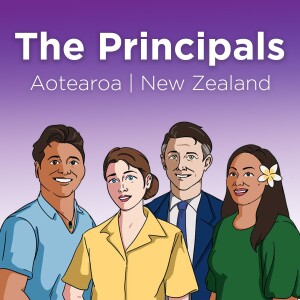
Tuesday Mar 18, 2025
Episode 28: Working with your ERO evaluation partner
The new process for ERO reviews means tumuaki work more closely with their ERO evaluation partner over the three-year cycle. In this episode, we talk about getting the most out of that relationship, and the process when ERO finds something that’s not going so well in a school.
My guests are:
- Shane Morrow, Manager Review and Improvement Services, ERO
- Sharee Hemingway, Director Ākonga Māori, ERO
- Stephen Lethbridge, principal of Point Chevalier School Rangi-mata-rau
- Nick Leith, tumuaki of Te Raekura Redcliffs School.
This podcast was produced for the Ministry of Education as part of Te Ara Tīmatanga mō ngā Tumuaki - The Beginning Pathway for Principals.
You can learn more about this topic by accessing Te Ara Tīmatanga mō ngā Tumuaki - The Beginning Pathway for Principals e-learning modules on the Education LMS: https://training.education.govt.nz
Show notes
Episode themes:
- Board assurance statements – useful for tumuaki to use it as a living document for ongoing internal audit. Ensuring you’re using data.
- Important to build an effective relationship with your evaluation partner and engaging with them well – good idea to make their email address a VIP contact so their emails come to the top of your list each time.
- Nick re: evaluation partner/tumuaki relationship: “One thing I've learned about this job is there are an absolute million plates spinning and quite a few of them are wobbling. And I guess if you can turn your attention to some of those wobbles for a period of time, you can get back to the things that are spinning great. But that's a supportive process rather than one that's only there for three days to catch the plates as they fall.”
- Preparation for an ERO visit is important.
- Helping staff manage their nerves when ERO is on site – it’s important to talk them through the process so they know what to expect.
- What happens if an evaluation partner finds something concerning in a school.
- How new tumuaki can understand where their new kura is in an ERO review cycle.
- How to find who your evaluation partner is.
Additional information
ERO website www.ero.govt.nz
School Improvement Framework (SIF) https://ero.govt.nz/how-ero-reviews/how-ero-reviews-schoolskura-english-medium/te-ara-huarau-the-new-approach-to-evaluation/school-improvement-framework
Board assurance statement and self-audit checklists https://ero.govt.nz/how-ero-reviews/how-ero-reviews-schoolskura-english-medium/Te-Ara-Huarau/The-Board-Assurance-Statement-and-Self-Audit-Checklists
Questions
00:45 [Stephen] What do you do to prepare for an ERO visit?
1:17 [Stephen and Shane] Can you talk me through what that board assurance statement covers?
5:07 [Nick] You mentioned that you used your first review as a way of getting to know your kura and the way everything works. How will you prepare next time?
7:55 [Shane and Sharee] Would you add anything to the preparation for an ERO visit?
9:45 [Stephen and Nick] How do you manage staff nerves about having ERO in the school?
13:41 [Shane] What happens if the evaluation partner finds that there's something not quite going so well in a school? How does that process work?
16:35 [Sharee] How does it work in the rumaki bilingual space?
18:52 [Shane] Does ERO help set up support where it's needed or is it a referral process to the Ministry?
20:16 [Shane and Sharee] When a new tumuaki steps in the building, how can they get their head around where a school is in that review cycle or where they are in the improvement journey?
22:11[Shane and Sharee] How can they find out who their evaluation partner is?
22:34 [All] What’s your advice to a new tumuaki approaching an ERO review?